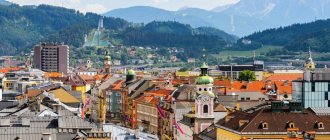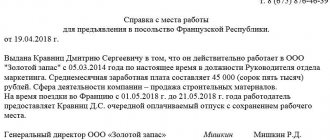Types of work visas
A work visa gives permission to work and live in Austria. You cannot get a job on another type of visa, for example, a tourist visa. An exception is citizens of the European Union who will not need a visa for employment, since Austria is a member of the EU and the Schengen area.
You can find out where it is easier to obtain citizenship in the European Union by following this link.
There are three types of work visa:
- The Jobseeker Visa.
- Blue Card EU (blue card).
- RWR Card (The Red-White-Red).
RWR Card
The Rot-Weiß-Rot card is issued for employment only with the employer for whom this document was issued. You cannot work for another organization.
This is what the Rot-Weiß-Rot map looks like
The RWR card is issued for a year, but after 10 months of work you can apply for an RWR Card Plus visa. It will allow you to find a job with any employer.
To select candidates for the RWR Card, an assessment system has been developed, where applicants must achieve a passing score. The following is assessed:
- Work experience.
- Education.
- Qualification.
- Type of professional activity.
- Candidate's age.
- Language skills.
Professional immigration to Austria is available to the following categories of persons:
- Highly qualified specialists. The passing score for this category is 70 out of 100 points.
- Representatives of scarce specializations (50 out of 75 points).
- Other specialists (50 out of 75 points).
- Families of professional immigrants (German language proficiency at least at level A1).
The family of a highly skilled worker has the right to immigrate immediately with the applicant. Families of persons of other categories - only after three months. Family members of a working immigrant who holds an RWR Card or RWR Card Plus visa automatically receive a RWR Card Plus.
The Jobseeker Visa
This visa is issued for 180 days for the purpose of independently searching for a job and passing an interview. A foreigner receiving this document is obliged to go to Austria and directly search for work there.
to obtain The Jobseeker Visa.
Application form for The Jobseeker Visa, 1 page.
Application form for The Jobseeker Visa, 2 pages.
To select candidates for a visa, the same point system is used as when receiving an RWR card. After the assessment, it is decided whether the applicant will receive a visa or not.
.
Criteria confirmation form
The job must correspond to the skill level and education of the applicant. If such a position has been in place for six months, the employer must inform the relevant authorities of its readiness to accept a foreign citizen. On this basis, the foreigner is issued an annual RWR Card visa.
If a person has not been able to find a suitable job within six months, he is obliged to leave the country. You can apply for a work visa to Austria again only after 12 months from the date of departure.
Blue Card EU
The advantage of the visa is that it is issued for two years. But it applies only to highly qualified specialists and only at the invitation of the employer.
Blue Card EU (blue card)
To receive a card, some conditions must be met:
- The position corresponds to qualifications and work experience.
- Availability of higher education.
- Wages are one and a half times higher than the country's annual average.
- The contract with the employer is concluded for at least a year.
- There are no Austrian candidates for this position.
The choice of Austrian visas is sufficient to meet certain requirements. Therefore, it is worth studying the latter in detail.
By the way, with a work visa you can do an internship as a volunteer or a paid employee.
Job search visa and RWR card in Austria
CONTENTS: Category “Highly qualified specialist” Category “Specialists in shortage professions” Category “Other specialists”
The law on “skilled migration of foreigners from third countries” adopted by Austrian legislators came into force on July 1, 2021. The Rot-Weiß-Rot – Karte (“Red-White-Red Card”) system is based on scoring and allows the following groups of people to move to Austria for permanent residence under professional immigration: - highly qualified specialists (Besonders Hochqualifizierte) must score at least 70 out of 100 points, - specialists in shortage professions (Fachkräfte in Mangelberufen) must score at least 50 out of 75 points, - other key specialists (Sonstige Schlüsselkräfte) must score at least 50 out of 75 points - and their family members (secondary applicants).
Interested persons can check their level of professional suitability according to the criteria on a point scale using the link on the AMS website (government migration portal)
Rot-Weiß-Rot – Karte is valid for 12 months and gives the right to work with the employer for whom it was issued. After a year, the employee can request a Rot-Weiß-Rot – Karte plus document, which allows him to work for any employer.
Category "Highly Qualified Specialist"
Highly qualified specialists are not required to submit an offer from the employer , provided they score a minimum number of points of at least 70 out of 100 points on the selection scale for HQS.
Applicants receive a 6-month Jobseeker visa search for work while directly in Austria.
The job found must correspond to the qualifications and professional level. If within 6 months there is a workplace corresponding to the qualifications of a specialist, then the employer applies to the competent authorities (Landeshauptmann, Bezirkshauptmannschaft, Magistrat) to issue a Rot-Weiß-Rot-Karte (RWR card) for a period of 12 months
If no suitable job is found within six months, the applicant is obliged to leave Austria. You can re-apply for a work-seeking visa after twelve months have passed from leaving Austria.
Category “Specialists in shortage professions”
Specialists in shortage professions from foreign countries can receive a “Red-White-Red Card” subject to the following conditions: - score at least 50 out of 75 on the selection scale for SDP, - completed special education in one of the shortage professions ( a list of shortage professions is compiled and published annually) is a job offer in Austria from a specific employer, providing the required minimum wage.
Other specialists
Other key specialists from foreign countries can receive the “Red-White-Red Card” if the following conditions are met: - score at least 50 out of 75 on the selection scale for other specialists , - have an offer from an employer in Austria that provides the required minimum salary .
Minimum wage for 2021: - for persons under 30 years old - 2,325 euros gross per month - for persons over 30 years old - 2,790 euros gross per month.
AMS employees check the applicant for the availability of an equivalent workforce among Austrian citizens and, if there are no suitable candidates for the position in the Austrian labor market, issue a positive decision
Category "Family Members"
Family members of RWR Card and RWR Card Plus holders can automatically receive an RWR Card Plus and, accordingly, the right to work with any employer in Austria, subject to proof of knowledge of German at least at level A1 (the most basic level). Family members of highly qualified specialists have the right to come to Austria at the same time as the applicant, family members of other groups - after 3 months after the applicant gets a job. the Common European Framework of Reference for Languages before entering Austria .
How to apply for an RWR card
Documents accompanying the application, translated into English or German, must be submitted to the consular section and forwarded to AMS (Arbeitsmarktservice) in Vienna for examination and evaluation. At the request of AMS, they must be certified by a notary.
List of documents for the category “Highly qualified specialist” List of documents for the category “Specialist in a specialty in short supply” List of documents for the category “Other key specialists”
These documents are provided to the Consular Section of the Austrian Embassy in Moscow in three sets: - 1 original package of documents, - copies of the originals in 2 copies (each copy on a separate sheet; double-sided copies are not accepted).
Also attached to the package of documents is an application and a criterion form from the Federal Service for Labor and Employment in English or German. Both highly qualified specialists and specialists in scarce and other key professions do not have to demonstrate knowledge of the German language before entering Austria. However, knowledge of German or English brings an additional 10 to 15 points), so the application must be accompanied by Diplomas or certificates of knowledge of the German language, in particular, can be obtained from the following institutions: ÖSD, Goethe-Institut, Telc GmbH, Austrian Integration Fund ( ÖIF) or English languages
An application for an RWR card is submitted: 1) either in person to the Austrian Embassy or Consulate in the country of residence, 2) or by a potential employer to the competent authority at the place of residence in Austria ( Landeshauptmann, Bezirkshauptmannschaft, Magistrat ). The basis for issuing the card is a written statement from the employer (Arbeitgebererklärung), confirming that the foreigner will be employed in a position corresponding to his education.
If a foreigner entered Austria on a Jobsseker visa to look for a vacancy, and a job is found, then the employer applies to the competent authorities (Landeshauptmann, Bezirkshauptmannschaft, Magistrat) to issue a Rot-Weiß-Rot-Karte (RWR card) for a period of 12 months.
Rot-Weiß-Rot – Karte plus (RWR-card plus)
After 10 months of working with the RWR Card, you can apply for the RWR Card Plus, which gives you the right to work for any employer in Austria. A regular RWR Card entitles you to work only for a specific employer/s.
WORK IN AUSTRIA. COLLECTION OF USEFUL LINKS
How to open a work visa
To open a work visa, you can contact an agency specializing in issuing visas (a tourist organization will not be suitable in this situation). For a fee, all procedures will be performed by employees instead of the applicant himself. If it is not possible to find such an agency or the budget is limited, then it is quite possible to cope on your own.
Link to the official website of the Austrian Embassy
Screenshot of the main page of the official website of the Austrian Embassy
To do this, you need to find out whether the applicant meets the requirements for opening a particular visa. Next, prepare the necessary documents, translate them into English or German, make copies, and have them certified by a notary. And submit the prepared package of documents to the appropriate institution.
Conditions of receipt
In Austria, when hiring, preference is given to highly qualified specialists with sufficient work experience. High quality education and skills acquired through work are valued. If a citizen has a profession in short supply (the list is updated annually and published on the Austrian website on migration issues), he will be no less in demand, even without a university diploma.
Foreigners are needed who can create additional jobs. They favor investors who are ready to invest money in the development of the country.
You can learn about business in Austria by following this link.
General requirements for candidates include:
- The level of education.
- Work experience in the position for which the applicant is applying.
- Good command of German.
- Candidate's age.
- Relevant income.
Among candidates for a particular position, Austrians are considered first and only then immigrants.
Who will need a permit
Citizens legally residing in one of the Schengen states do not have to apply for any kind of permit, even if they stay in the state for a long time.
Permission must be given to foreigners who do not reside in the EU and plan to stay in the country for three months or more. To obtain a permit, a foreign citizen must receive an invitation from his employer (transferred to the Austrian embassy).
What professions are in demand and how much do they pay?
In Austria there is no minimum wage threshold, however the average salary is more than 2021 euros/month. In terms of income, Austrians are among the ten richest in Europe.
You can find out about high salaries in Austria by following this link.
Approximate salaries (euros):
- Secretary - 1200.
Secretary salary in Austria ($): (1) Experienced (2) Mid-career (3) Entry level - Cook - 1300.
Cook salary in Austria ($): (1) Experienced (2) Mid-career (3) Entry level
- Waiter - 1300.
Waiter salary in Austria ($): (1) Experienced (2) Mid-career (3) Entry level - IT specialist - 2000.
Salary - Austria ($): (1) Software developer (2) System administrator (3) Database administrator - Bank employee - 2100.
Salary in Austria ($): (1) Financial Analyst (2) Financial Consultant (3) Credit Officer
- Builder - from 2300.
Salary in construction, Austria ($): (1) Construction worker (2) Warehouse worker (3) Support worker - Engineer – 2500.
Salary of engineers in Austria ($): (1) Automotive engineer (2) Chemical engineer (3) Civil engineer - Architect - from 2500.
Architect salaries in Austria ($): (1) Experienced (2) Mid-career (3) Entry level
- Doctor - from 3000.
Salaries of doctors in Austria ($): (1) Doctor (2) Cardiologist (3) Surgeon
The most popular specialties in 2021:
- Roofer.
Roofer salaries in Austria ($): (1) Experienced (2) Mid-career (3) Entry level - Nurse.
Nurse salary in Austria ($): (1) Experienced (2) Mid-career (3) Entry level - Nurse (relevant certificate required).
Nurse's salary in Austria ($): (1) Adult nurse (2) Child nurse (3) Medical laboratory technician
- Highly qualified engineer.
Engineer salaries in Austria ($): (1) Experienced (2) Mid-career (3) Entry level
You can find out about work and available vacancies in Vienna by following this link.
Austria is one of the leading countries in the world in terms of social and economic well-being. If you plan to move to this country, you need to immediately take care of documents, visa, work and place of residence.
You can learn about obtaining a visa to Austria for Ukrainians by following this link.
Permitted period of stay on a work visa
Typically, an Austrian work visa is valid for six months. Upon arrival in the country, the foreigner acquires a permit to stay in Austria in accordance with the rules of the signed agreement.
If a foreign citizen needs to stay in the country for a long time, then a work visa is issued with the possibility of extending it. And then get a residence permit.
Austria residence permit card
Is it possible to stay in Austria forever on a work visa?
The requirements for obtaining an entry document for work have become noticeably stricter over the past few years. This is due to unscrupulous immigrants who try to resettle in Austria for permanent residence by any means (including illegal ones). They present false information, forged documents, and declare intentions that are far from the truth.
To limit such cases, employees of the Austrian embassies very carefully check the submitted documents and set conditions that not everyone meets.
However, there are plenty of legal ways to stay in Austria, one of which is a work visa. If a foreigner lives and officially works for at least a year in Austria, he may be allowed to apply for a residence permit. Next, you can apply for a permanent residence permit and cherished citizenship.
This is what an Austrian passport looks like
More information about immigration methods to Austria can be found by following this link.
But there is a simpler alternative to this process - to become a citizen of Romania. It is much easier for residents of this country to obtain Austrian citizenship and the list of documents is not so extensive.
Obvious advantages of Romanian citizenship
Russians who have (or had) relatives living in Romania from 1918 to 1940 can apply for citizenship immediately after receiving a visa. The relationship is documented.
The main advantage of Romanian citizenship is that no special permits are needed to work in Austria, since Romania is part of the European Union. In addition, a longer stay in the country is possible. Romanian citizens travel freely throughout Europe without additional entry documents and can study, work and live.
And another advantage is that Russians, when receiving Romanian citizenship, do not have to give up Russian citizenship.
You may be interested in Countries that allow dual citizenship with Russia.








